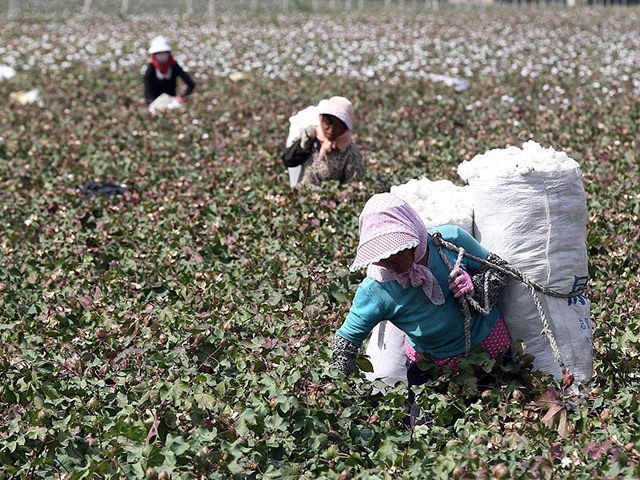U.S. Customs and Border Protection (CBP) announced Wednesday that it would not allow any cotton or tomato products from Xinjiang, China’s westernmost province, into the country due to the high likelihood that they were produced by slave labor.
Xinjiang is the homeland of the nation’s Muslim-majority Uyghur ethnic group, which has faced severe repression by the Chinese Communist Party for decades, culminating in the construction of over 1,000 concentration camps to house members of the group. Survivors of the camps — which at their peak populations were believed to have imprisoned as many as 3 million people — say that Communist Party officials force Uyghurs and other ethnic minority people to endure indoctrination, torture, forced sterilization, forced abortions, rape, and slavery at those camps.
A study released in March 2020 revealed that forced labor was not limited to Xinjiang. According to the Australian Strategic Policy Institute (ASPI), the Chinese government incentivized companies throughout the nation to use Uyghur slaves, presumably shipped out of the Xinjiang camps, in forced labor for the manufacturing of products sold by dozens of international companies, including brand names like Nike, BMW, and Nintendo. Subsequent reports have revealed that cotton-picking, an extremely arduous undertaking, has become a preferred industry for the Chinese Communist Party to force Uyghurs into.
In research published last month, Dr. Adrian Zenz revealed Beijing uses sophisticated “poverty alleviation” mobile applications to target Uyghurs to enslave in cotton fields.
CBP had previously limited imports into the United States of Xinjiang cotton products by specific companies believed to benefit from slave labor, but has now expanded that to all Xinjiang cotton. It has not limited shipments from other parts of China, where evidence suggests Uyghurs have been bussed in to engage in forced labor.
Over 80 percent of the cotton cultivated in China comes from Xinjiang, representing about a fifth of the cotton produced around the world.
“DHS [the U.S. Department of Homeland Security] will not tolerate forced labor of any kind in U.S. supply chains,” acting DHS Deputy Secretary Ken Cuccinelli said in a statement Wednesday. “We will continue to protect the American people and investigate credible allegations of forced labor, we will prevent goods made by forced labor from entering our country, and we demand the Chinese close their camps and stop their human rights violations.”
The CBP explained that the new order will “direct CBP personnel at all U.S. ports of entry to detain cotton products and tomato products grown or produced by entities operating in Xinjiang.” Extensive evidence exists, CBP noted, that tomato products from Xinjiang are also produced using widespread forced labor.
“The agency identified the following forced labor indicators through the course of its investigation: debt bondage, restriction of movement, isolation, intimidation and threats, withholding of wages, and abusive living and working conditions,” CBP explained. It listed the affected products as including, but not limited to, “apparel, textiles, tomato seeds, canned tomatoes, tomato sauce, and other goods made with cotton and tomatoes.”
Textile manufacturers have complained in the past that limiting imports from China and forcing them to find options that do not use slave labor would hurt their business.
“As a country, we simply do not have the capability or capacity to implement or comply with or enforce a blanket WRO [Withhold Release Order],” Stephen Lamar, head of the American Apparel and Footwear Association (AAFA), told Congress in September 2020, objecting to Congress’s Uyghur Forced Labor Prevention Act, which would ban imports from Xinjiang generally with exceptions only for those who can prove their products were not made with forced labor.
While most companies accused of using Xinjiang slave labor — even those reportedly lobbying Congress to let them continue the practice, like Nike and Coca-Cola — do not promote the fact that they do business in the region, some openly boast about it. In the credits at the end of the Disney film Mulan, the corporation thanks Xinjiang police authorities, responsible for running the concentration camps, for their help in filming the movie. Companies like Japan’s Uniqlo advertise that their clothing is superior because it is “made from Xinjiang cotton, famous for its superb quality.”
The Chinese Communist Party reacted with ire to the new limitations.
“China is firmly opposed to this,” Chinese Foreign Ministry spokesman Zhao Lijian said Thursday, in response to a question from a reporter about the CBP move. “‘Forced labor’ is the biggest lie of the century made by persons and agencies in some Western countries including the United States, with an aim to restrict and suppress the relevant Chinese authorities and companies and contain China’s development.”
Zhao called concerns about slavery “despicable.”
Similarly, Wang Wenbin, a colleague of Zhao’s, complained last year that the CBP’s prior limitations on imports from Xinjiang were a “naked act of bullying” against China.

COMMENTS
Please let us know if you're having issues with commenting.